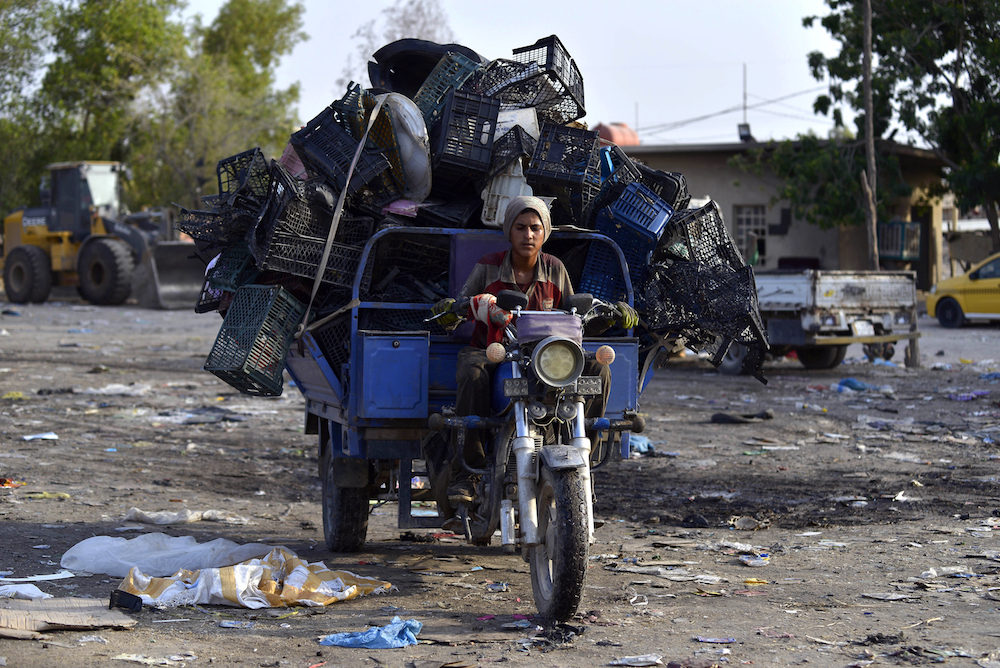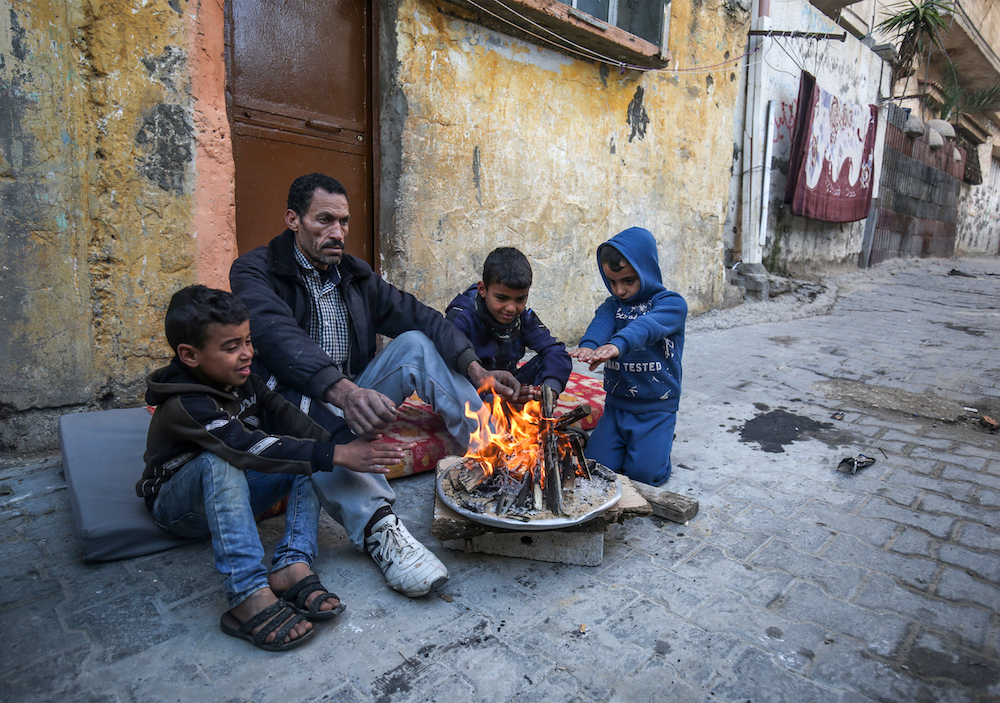Will coronavirus shock make Arab region ready for universal basic income?
DUBAI: Denmark’s government has guaranteed workers affected by the country’s lockdown a minimum of 75 percent of their salaries.
In Italy, populist politician Beppe Grillo is calling for regular payments to “Italians [who] won’t have a secure income in the next few months.”
In the US, House Speaker Nancy Pelosi is willing to look into instituting a universal basic income (UBI) for Americans, which was at the heart of former Democratic hopeful Andrew Yang’s presidential campaign.

As people across the world are being ordered to shelter in place to contain the spread of the coronavirus disease (COVID-19), how they will make basic ends meet has become one of the biggest questions facing policymakers.
Liberal activists are hoping that governments adopting cash transfers as a temporary emergency measure will be compelled to retain it once citizens have seen its benefits.
As in the rest of the world, however, the idea of guaranteeing everyone an income both tantalizes and terrifies the Arab region.
“No country in this world is ready for UBI, an unconditional payment to all residents without any conditions,” said Dr. Osman Gulseven, associate professor at Skyline University College in Sharjah.

“This is not only economically infeasible but also financially impossible for most Arab countries. Those payments will come from taxes, which will again be collected from society — specifically the working middle class.
“It is quite illogical to transfer money from the working people to everyone else.”
Although some countries have initiated UBI-like schemes to shore up their COVID-19-battered economies, he does not view it as a potential long-term solution.
“This is an unprecedented crisis period,” Gulseven told Arab News. “Typically, any money paid by the government has to be financed from somewhere. Printing money will cause inflation, which has devastating effects on the economy.”
Taxing more from sales and income will further crimp economic activity, in his view.
Opinion
This section contains relevant reference points, placed in (Opinion field)
“It is also impossible to pay back everything without financial resources,” Gulseven said. “Arab countries do not have the financial means for UBI. Only a few Gulf countries with substantial currency reserves can afford UBI, that too only for their citizens.”
Gulseven’s view is seconded by George Politis, visiting lecturer at the Costas Grammenos Centre for Shipping, Trade and Finance, who says UBI will not work in periods of financial distress.
“We need normality, functioning economies, growth and prosperity,” he said. “Once normality is achieved, the key indicators to study will be GDP per capita, public spending-to-GDP ratio, and poverty levels in order to calculate how much is needed for a given population and whether the state can afford the cost.”

Politis said UBI in emerging markets could only work through an international or regional body since states cannot self-finance such a policy.
“The lesson from the EU is that there is little appetite among larger and smaller economies for mutual financial collaboration towards surviving the current crisis,” he said.
The International Labor Organization (ILO) estimated in 2018 that UBI’s impact on poverty and inequality depends on such factors as the level of benefits, their capacity to meet people’s needs, and sources of funding.
FASTFACT
17.9%
GDP cost of UBI if adopted in MENA. (Source: ILO)
The study found that the cost would range from 17.9 percent of GDP in the Middle East and North Africa (MENA) region to about 25 percent of GDP in Asia, Europe and Latin America.
“Some UBI proposals have the potential to advance equity and social justice, and others do not,” the ILO report said.
“Governments that consider implementing a UBI should carefully examine all options, including the progressive or regressive aspects of the proposed measures, the winners and losers, and the potential risks and trade-offs.”

According to Dr. Albadr Al-Shateri, former politics professor at the National Defense College in Abu Dhabi, UBI would be an excellent idea for the Arab world, but the groundwork has yet to be laid.
“The development of citizenship in the Western context passed through three phases: first civil liberties, then political participation and finally economic rights,” he told Arab News.
“The Arab world, or any other region for that matter, cannot skip stages.”
He said most Arab countries will be hard-pressed to implement UBI as such a scheme requires sustainable economic structures, something most of them lack.
“Many Arab countries rely on one or two products to maintain their income, which are subject to the vagaries of the international market,” Al-Shateri said.

“Even if states in the Levant can maintain a sustainable economy, UBI would be hard to sustain. And if a good segment of the population expects regular income from the government, failure to meet that expectation would have dire political consequences.”
Al-Shateri says the dual shock of wars and the COVID-19 pandemic does not bode well for the future of the MENA region.
“Gulf Cooperation Council (GCC) countries are not in position to extend a helping hand because of the fall of oil prices, the economic slowdown and the war in Yemen,” he said.
Even before the COVID-19 storm hit, economic conditions in many Arab countries were precarious at best.

Lebanon was already on the verge of collapse, and Syria was reeling from the aftermath of the civil war, which had also damaged the Jordanian economy.
The Palestinian economy remains heavily dependent on the generosity of foreign donors.
“The Levant region might experience more political conflict as a result of the economic woes,” Al-Shateri said.
Cyril Widdershoven, director at Verocy, a Dutch consultancy advising on investments, energy and infrastructure risks and opportunities in the Arab region, concurs with Al-Shateri’s gloomy prognosis.
“Jordan is struggling owing to a lack of reserves, desert agriculture and high unemployment,” he told Arab News.
If the GCC countries are hit by an economic crisis, foreign workers from Egypt, Jordan and Lebanon would face unemployment, which in turn would affect the budgets of their home countries because of the dependence on Gulf remittances, Widdershoven explained.
“Priority should be given in the post-coronavirus era to diversification of economy, population control and sustainable GDP growth. Demand for migration will increase as fewer opportunities at home will force young people to look towards the US, EU and Australia.”
The potential and most obvious solution for many is International Monetary Fund (IMF) assistance, although it already has applications for support from more than 90 countries, says Politis, who is also a part of the Faculty of Finance at Cass Business School at the University of London.
“The terms for funding will probably be more relaxed than before. After all, this is a global humanitarian problem,” he told Arab News.
“Additionally, a number of local foundations and ultra-wealthy individuals could support people in need, such as refugees and immigrants.”
Some experts expect Levant countries to seek IMF support and use Arab Monetary Fund help for the financing of essential activities.
“There is a very sharp decline from remittances to Levant countries. I expect a devaluation in the Jordanian dinar as there are just not enough reserves to keep the exchange rate pegged to the US dollar,” Gulseven said.
“Poverty and income inequality have always been a significant problem in the region. While I think poverty will increase, I do not see any mass hunger situation.
“The Levantine area has fertile soil suitable for many kinds of agricultural activities and the region is a major exporter of grain, fruit and vegetable.”
Gulseven says the crisis is likely to give a boost to agricultural activities in the Arab region, adding that it is essential that enough of this food supply stays within the region.
“As long as we stay in peace together, we can withstand these difficult times,” he told Arab News. “However, standing together means a fair sharing of income and reduced inequality.
“People in the Levant are already questioning the role of the government in society, and the hungry and desperate will start taking action because they will think they have nothing to lose.
“Now is not the right time for any kind of internal or regional conflicts, so decision-makers should treat the ensuring of food and social safety for all as a matter of utmost importance.”






Saudi employers given green light to cut wages, hoursUK to pay workers’ wages as economy shuts down due to coronavirus



